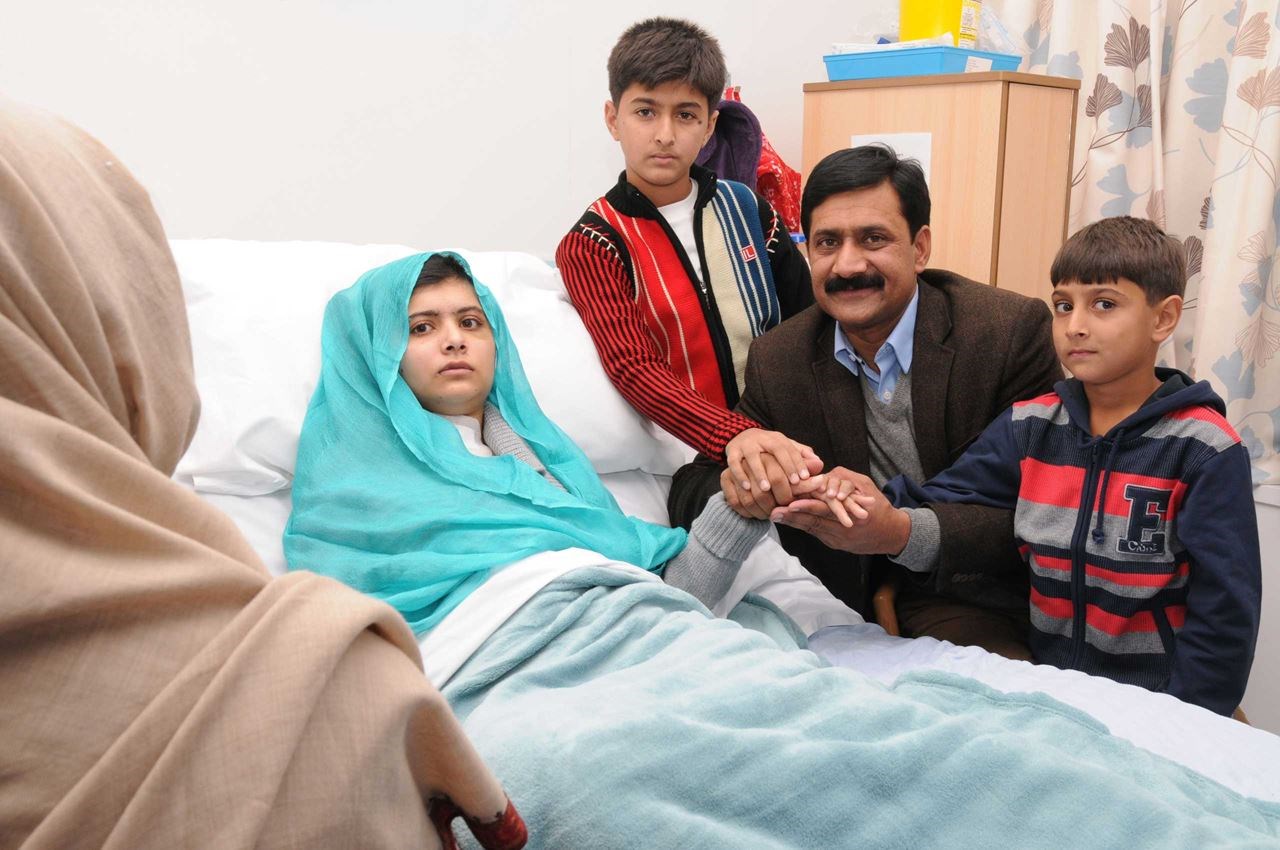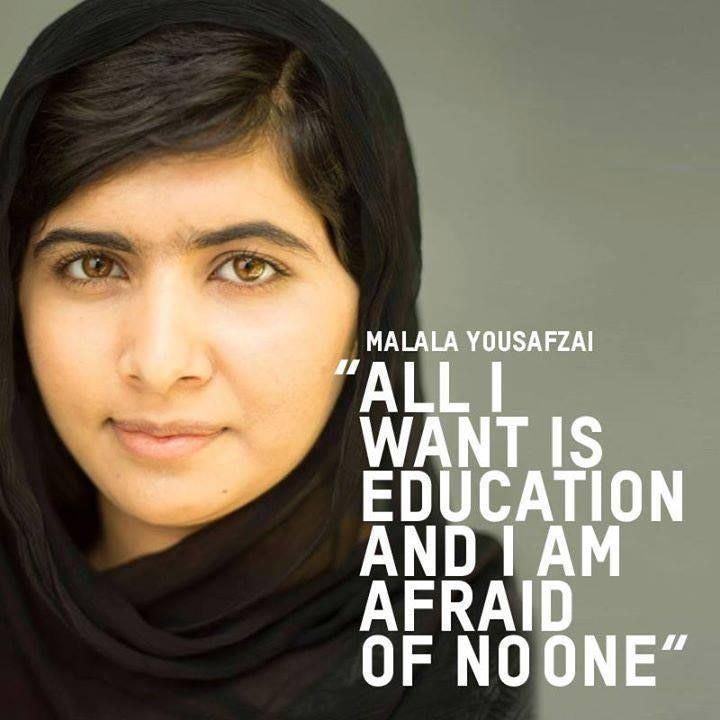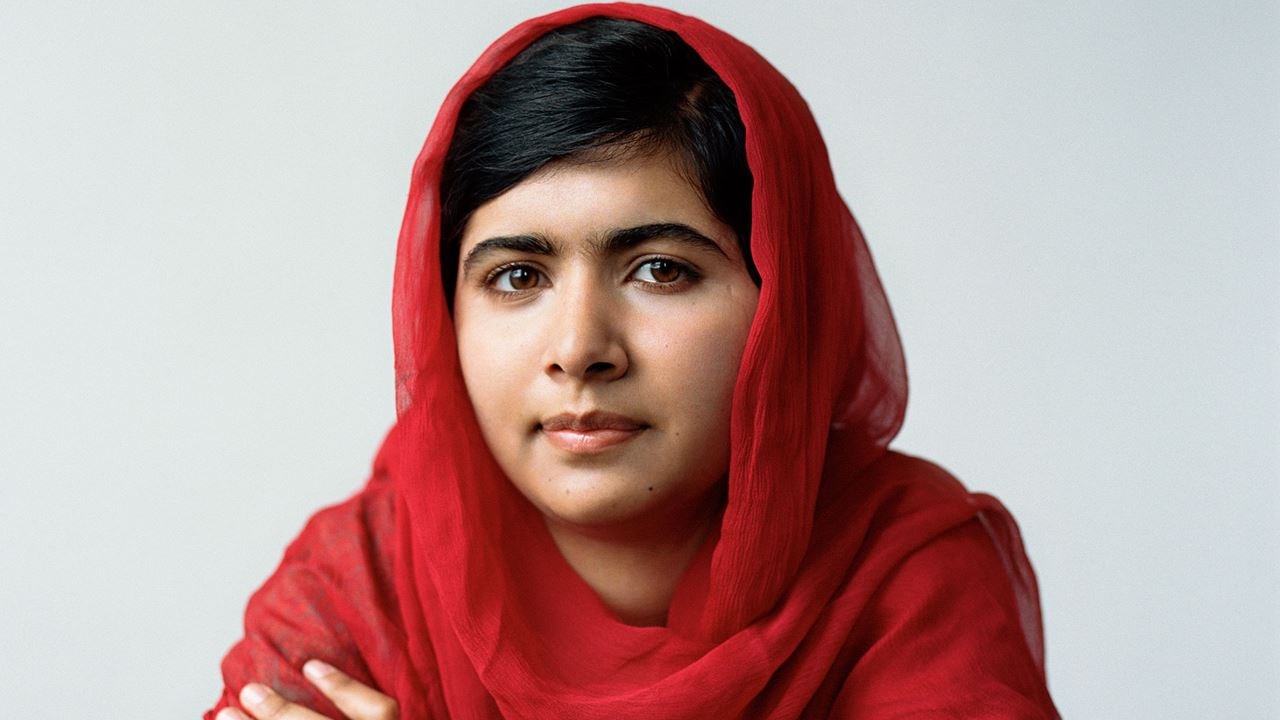 Malala in the Hospitalhttps://time.com/3490769/malala-yousafzai-the-day-i-woke-up-in-the-hospital/Malala Yousafzai grew up in a community paralyzed by fear. The Taliban seized her hometown in Swat Valley Pakistan. From that moment forward, violence reigned over the citizens of Swat Valley. The Taliban banned women from congregating in public and receiving education. These challenges did not stop Malala. She began blogging for BBC about living under the daily threats of the Taliban. In order to protect identity, she used wrote under the name Gul Makai. Her heartfelt articles stirred the emotions of readers. She won Pakistan’s National Youth Peace Prize in 2011 after her true name was discovered and published. The national praise she received for being an intelligent, young woman angered the Taliban, putting Malala in grave danger. Her risks eventually caught up with her. On October 9, 2012, a masked gunman boarded Malala’s bus on the way home from school. He demanded to know which girl was Malala. When the other girls glanced in her direction, the gunman shot fifteen year old Malala in the head. She was airlifted to a local hospital in Peshawa, Pakistan and then moved to Birmingham, England to be cared for further. Malala’s survival was a miracle. Not only did she recover, but she also felt a stronger need to speak out against the violence she and others have experienced. She used her fame to spread her message of peace and equality. In 2013, she published her international bestseller I Am Malala. Later, she became a winner of many international prizes. I chose to write about Malala because she is my personal hero. Yousafzai faced many difficult obstacles but never once gave up her beliefs. Her bravery, determination, and willingness to fight for education, women’s rights, and peace makes Malala a hero this century needs desperately.
Malala in the Hospitalhttps://time.com/3490769/malala-yousafzai-the-day-i-woke-up-in-the-hospital/Malala Yousafzai grew up in a community paralyzed by fear. The Taliban seized her hometown in Swat Valley Pakistan. From that moment forward, violence reigned over the citizens of Swat Valley. The Taliban banned women from congregating in public and receiving education. These challenges did not stop Malala. She began blogging for BBC about living under the daily threats of the Taliban. In order to protect identity, she used wrote under the name Gul Makai. Her heartfelt articles stirred the emotions of readers. She won Pakistan’s National Youth Peace Prize in 2011 after her true name was discovered and published. The national praise she received for being an intelligent, young woman angered the Taliban, putting Malala in grave danger. Her risks eventually caught up with her. On October 9, 2012, a masked gunman boarded Malala’s bus on the way home from school. He demanded to know which girl was Malala. When the other girls glanced in her direction, the gunman shot fifteen year old Malala in the head. She was airlifted to a local hospital in Peshawa, Pakistan and then moved to Birmingham, England to be cared for further. Malala’s survival was a miracle. Not only did she recover, but she also felt a stronger need to speak out against the violence she and others have experienced. She used her fame to spread her message of peace and equality. In 2013, she published her international bestseller I Am Malala. Later, she became a winner of many international prizes. I chose to write about Malala because she is my personal hero. Yousafzai faced many difficult obstacles but never once gave up her beliefs. Her bravery, determination, and willingness to fight for education, women’s rights, and peace makes Malala a hero this century needs desperately.
Malala’s determination is a value I greatly admire about her. The shooters' intentions were to silence Malala and, with her, women around the world. However, the attempted assassination backfired. Instead of silencing her, the attempted assassination put her in the spotlight. The silencing shot became a microphone. Yousafzai explained “The extremists were, and they are, afraid of books and pens. The power of education frightens them. They are afraid of women…” Although attempts were made on her life, Malala’s voice grew stronger. She spoke only about the violence against women and education around the world. “Let us pick up our books and pens. They are our most powerful weapons,” she urged after her attempted assassination. Her determined spirit continued to fight for life in the emergency care of the hospital and then again for the rights of those without voices. This determination is one of the things I admire most about Malala. People in this century need a figure that can and will crusade for their beliefs, no matter what obstacles obstruct their path.
 Malala Speaking on Educationhttps://i.pinimg.com/736x/8a/50/76/8a5076c61ae178ed5417ca4449b1f0e8.jpgNot only should her determination be commemorated, but also her bravery. Her actions leading up to and after the attempted assassination prove the extent of her courage. First, after the Taliban took over Swat, she continued to sneak to school along with her friends to get an education. In addition, after her identity was revealed by BBC as the writer of many inspiring news articles, Yousafzai continued to write even though she was under scrutiny by the Taliban. Then, on October 9, 2012, when a masked gunman invaded the bus and demanded Malala, she did not run. She sat still in silence, a brave decision. She did not redirect the shooter to another girl nor try to take back what she had written in her articles. She sat bravely, fighting for women and education, fighting for peace. Yousafzai explained, “The terrorists thought that they would change our aims and stop our ambitions, but nothing changed in my life except this: weakness, fear and hopelessness died. Strength, power and courage were born.”
Malala Speaking on Educationhttps://i.pinimg.com/736x/8a/50/76/8a5076c61ae178ed5417ca4449b1f0e8.jpgNot only should her determination be commemorated, but also her bravery. Her actions leading up to and after the attempted assassination prove the extent of her courage. First, after the Taliban took over Swat, she continued to sneak to school along with her friends to get an education. In addition, after her identity was revealed by BBC as the writer of many inspiring news articles, Yousafzai continued to write even though she was under scrutiny by the Taliban. Then, on October 9, 2012, when a masked gunman invaded the bus and demanded Malala, she did not run. She sat still in silence, a brave decision. She did not redirect the shooter to another girl nor try to take back what she had written in her articles. She sat bravely, fighting for women and education, fighting for peace. Yousafzai explained, “The terrorists thought that they would change our aims and stop our ambitions, but nothing changed in my life except this: weakness, fear and hopelessness died. Strength, power and courage were born.”
The last reason Yousafzai is my hero is because she chooses to be an advocate for equality, peace, and the battle against ignorance. Nine months after being shot, Malala gave a speech at the United Nations which focused on education for all and women’s rights. She described a commodity most developed countries take for granted: education. “Education is neither eastern nor western. Education is education and it's the right of every human being,” she said in her speech. If the world could be eradicated of ignorance and indifference, it would be a more stable, safer place. By continuing her campaign, she received the Nobel Peace Prize as well as the Sakharov Prize for Freedom of Thought at the age of seventeen. Speaking on her hopes for the world she explained “I am only talking about education, women's rights, and peace… I want every girl in Pakistan to go to school.” Her vision is one that people worldwide can bolster. Around the world, people ought to treat each other with a stronger sense of equally. Her vision is the last and most defining thing which makes her my personal hero and a leader the world craves. She is a leader which watches out for humanity instead of the economic interest of a single group of people, making her an extremely rare commodity.
Malala’s story is not one of survival but of triumph. Her bravery, determination, and advocacy for the equality makes her my hero. Her stance for the rights of women makes her an equivalent of Martin Luther King and Gandhi. She has never called for revenge on her attackers, but instead spread the word of peace. In she speech to the UN she pronounced her beliefs that, “Education is not a privilege. Education is a right. Education is peace.” Her courage is testament that violence is not the answer. She cannot be silenced. Malala is an idol to lead us into a better future where equality reigns and there are human rights for all.
 Headshot of Malala Yousafzaihttps://sachtimes.com/en/wp-content/uploads/2017/08/images_malala-y.jpg
Headshot of Malala Yousafzaihttps://sachtimes.com/en/wp-content/uploads/2017/08/images_malala-y.jpg
Works Cited:
Husain, Mishal. “Malala: The Girl Who Was Shot for Going to School.” BBC News, BBC, 7 Oct. 2013, www.bbc.com/news/magazine-24379018.
Kettler, Sara. “Malala Yousafzai.” Biography.com, A&E Networks Television, 6 Nov. 2017, www.biography.com/people/malala-yousafzai-21362253.
Yousafzai, Malala. “TRANSCRIPT: Malala's Speech at UN Sustainable Development Summit 2015.” Malala Fund, Malala Fund, 25 Sept. 2015, blog.malala.org/transcript-malalas-speech-at-un-sustainable-development-summit-2015-c8d6ece5c600.
Page created on 1/8/2018 5:13:50 PM
Last edited 1/10/2018 8:05:34 PM
